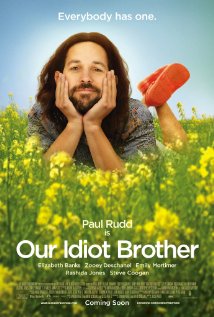
On the recommendation of a friend I’m reading a fascinating new book, Timothy Wilson’s Redirect: The Surprising New Science of Psychological Change. I also recently saw Our Idiot Brother, and the two have me thinking.
The brainy one first: Redirect talks about the power of the interpretations we give events. A simple example: someone who gets an F on a test and tells themselves “I’m really going to need to step up my studying” will get very different results than someone who tells themselves “I’m just not cut out for this subject, this class, maybe this school.”
Given equal capacity and a level playing field, someone who can frame setbacks and difficulties in a way that’s meaningful and gives them hope will be aligning themselves to take concrete actions that make success, and eventually happiness, more likely.
Wilson calls this “redirection” of the stories we tell ourselves. While his writing can be a little dull and he discounts magic a little too much for my tastes, he backs up his theories with lots of science and good examples, giving us powerful ways to think about shaping our own and others’ ability to cope and to thrive.
Looking at parenting, he joins the chorus of voices saying we need to stop complimenting kids so much on their intrinsic skills (good at reading, smart at math), and reframe it more as being impressed how hard they worked, how much they tried, and how they solved problems. What happens when we’re “good at math” and can’t understand a new topic? Are we at the end of our intelligence? If instead we value and reward effort and resilience, in ourselves and our kids, when difficulties come up we’ve got more to work with. So he likes feedback like “I’m impressed with how hard you’ve been practicing your instrument” or “you’ve really showed determination in this situation.” Words that will help kids build a competent, creative vision of their abilities.
It’s so interesting to run into this book on a week when I’ve been feeling like a poor student. So in the dental arena, I’ve been reframing my quest for toothbrushing excellence, taking specific steps for improvement, rather than wallowing in I’ll-never-do-it despair. I now have a clock with a second hand in the bathroom, and I’m timing myself, making it a Yogic exercise: Be Here Now. (Is it pathetic that I’m a little bit excited about this? Maybe. Probably, but oh well!)
 Redirection has given me a new way to think about what I sometimes think of as my “Pollyanna” side, the me that wants to have a happy explanation for every event, look on the bright side, give the benefit of the doubt.
Redirection has given me a new way to think about what I sometimes think of as my “Pollyanna” side, the me that wants to have a happy explanation for every event, look on the bright side, give the benefit of the doubt.
Sometimes I feel like a sucker for this quality, and of course sometimes I should stand up for something, rather than accepting things as they are. But in so far as this gives me a way to give meaning and hope to challenges, I’m framing the situation in a way that I don’t feel like a victim, and feel good about going forward.
This brings me to the quirky film Our Idiot Brother. Paul Rudd, as the idiot of the title, isn’t so much dumb, as ruthlessly, sometimes groundlessly optimistic. He’s got as rose-colored a view as you can have, and one thing I liked about the movie is that it gets him in quite a bit of trouble sometimes. Stupid trouble that most of us could easily avoid. Yet he takes the consequences of his actions, and his “clueless” approach to life ends up making a lot of good things happen, and makes the people around him see problems they’ve been avoiding or denying. The movie veers between being a cringe-inducing car wreck of social manners, and a touching look at someone who has a radically kind, generous way of looking at things. Goofy as he is, his unwillingness to go along with what everyone else wants or thinks is right is inspiring.
Maybe books, movies, and all our philosophy are just ways we explain ourselves to ourselves. The person who recommended Redirect is the most optimistic, high-achieving person I’ve ever met in my whole life. I wonder if it doesn’t just explain something to him that he understands already.
So for today I’m telling myself a story of magic, mystery, and cosmic love. Our kids are on their way to us–through the Social Welfare system, aided by a dose of magic we can’t explain. Having done all we can do in the process, I think my job is to feel that the setbacks were “meant to be,” the ones we’ve lost were due to a higher purpose, and the right little beings are on their way to us.
When they get here I hope I feel as good about the process as possible, because even if my interpretation is a huge delusion, I think it’s one that will help me, help the kids, and maybe help us all.


